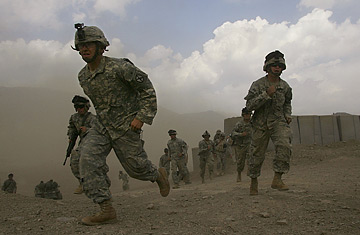
U.S. soldiers unload a supply helicopter between Taliban rocket attacks October 24, 2006 at Camp Tillman in the Paktika province of eastern Afghanistan.
While the request needs the approval of the Joint Chiefs of Staff before it can be presented to President Bush, Secretary of State Robert Gates — on his first trip to Afghanistan — appears receptive to the idea.
Eikenberry, who is coming to the end of his second tour in the country but will leave Afghanistan later this month, argues that 2007 is critical. The Taliban has returned with a vengeance, Pakistan has become a safe haven for insurgent attacks, NATO has failed to send as many troops as initially pledged, and indications are that the enemy is gearing up for a new offensive. "It is going to be a violent spring," Eikenberry told a small group of reporters in Kabul on Tuesday.
The violence in Afghanistan has reached the worst levels since the U.S. attack against the Taliban in 2001-2002. In a briefing for several reporters in Kabul earlier this week, a U.S. military intelligence officer disclosed grim statistics on insurgent attacks in Afghanistan: 139 suicide attacks in 2006, up from 27 in 2005, and 1,677 roadside bombs last year, compared with 783 in 2005. So-called direct attacks (small arms, grenades and other weapons) tripled from 1,558 in 2005 to 4,542 last year. In one area on the Afghan-Pakistan border, the focus of a peace pact signed last September, attacks from safe havens inside Pakistan have jumped some 300%. "The enemy is taking advantage of that agreement to launch attacks into Afghanistan," said Army Colonel Tom Collins, Eikenberry's spokesman.
Many military officers have complained that Washington has failed to keep its focus on the fight in Afghanistan. But that attitude may be changing. "We cannot let the success in Afghanistan slip away," Gates told reporters on Wednesday, adding that he would be "very sympathetic" if more forces were recommended.
Pentagon officials would not discuss exactly how many troops Eikenberry wants to add to the 18,000 U.S. troops already in Afghanistan, but estimates are that it could be several thousand. "There will be no decrease in U.S. forces and they could go higher," said Eikenberry. When asked by a reporter today if the U.S. military was too strained by Iraq and other commitments to send more troops to Afghanistan, Gen Peter Pace acknowledged that "any kind of deployment is going to add a short-term strain." But he said that a short-term increase in troops could actually mean less strain on the force over the longer run.
The call for more troops is coming at a time when NATO appears unable or unwilling to take the fight to the enemy. It has failed to send some 3,000 troops it has pledged, and even some of those soldiers operate under rules that preclude the toughest combat. NATO commanders also appear to be minimizing the worsening situation in Afghanistan. A briefing by a British general in the NATO chain told reporters that a recent "spike" in violence had come and gone. Other military sources attribute the slackening to the cold of Afghan winter.
